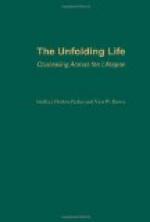HUNGRY SENSES
Hungry senses, directed in their quest by a hungrier mind, mark the second great characteristic of early childhood. These are the channels through which the world around comes into the life of the child. The sights and sounds of the physical realm, when carried beyond the portals of the senses, under the marvelous transmutation of God’s touch, become ideas. The process, in so far as its secret has been revealed, will not be discussed at this point, but rather the relation of these impressions to character.
In early years the senses are undiscriminating as far as the real worth of an impression is concerned. The vulgar picture will be admired as quickly as the beautiful one, if its colors are attractive. The impure word is caught as readily as the pure. There is no standard of values; even taste is not yet formed, and eyes and ears hungrily reach out for anything to satisfy their voracious appetite. Each sensation which is reported to the mind through the senses and intricate nervous system, supplies an idea, embodying itself. It is with these that all the thinking of the child is done, these rouse his feelings and prompt his actions and, finally, mean character. Manifestly, then, his life can be no better than the things he sees and hears, handles and tastes, for he lives in a world of sensations and not of ideas. This was the thought of the mother who said, “I never wash my little children’s faces at night, and put them to bed all sweet and clean on the outside, that I don’t think that I would give all the world if I could somehow get inside and wash that too.” But the inner cleansing from the influence of sight and sound no hand can perform. God forgives sin, but even His touch does not remove the impression of the picture or the word which memory has put away. The only hope of beautiful character lies in bringing to the unfolding life helpful influences which shall be stronger in their power than the vitiating. When some definite counteracting impression is needed, it is in the sacred confidences of the twilight hour, and at the confessional of a mother’s knee, that it can be most effectively given.
Aside from the moral import of the impressions, there is a vital relationship between the senses and the quality of the intellectual life. Since knowledge can come to the child only through his senses, the amount of knowledge, as well as its sort, depends upon the story the senses tell. If they be dull, the knowledge is meagre and life has little with which to build. If they be defective, the impression is either falsely reported or not at all. Tests have revealed the amazing fact that over fifty per cent of children have imperfect sight and hearing. This means that the first idea given through eye or ear may be wrong; consequently each subsequent idea growing out of it is wrong, at least in part, and ultimately, false conceptions and mistaken courses of action appear, all traceable directly to the ear that did not hear accurately and the eye that told a false tale.




